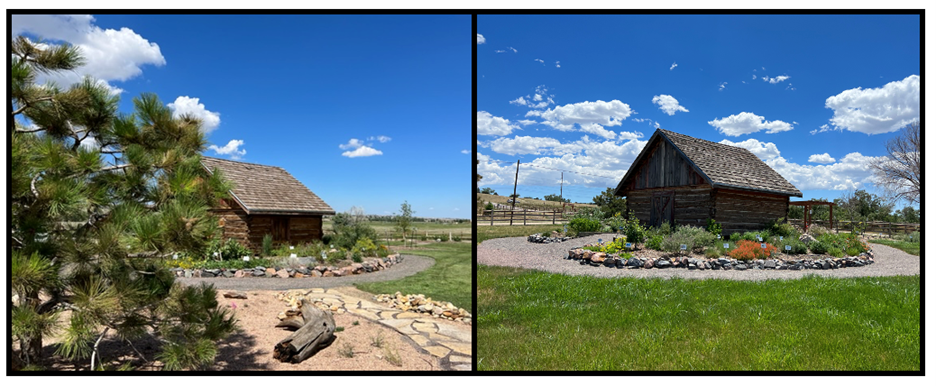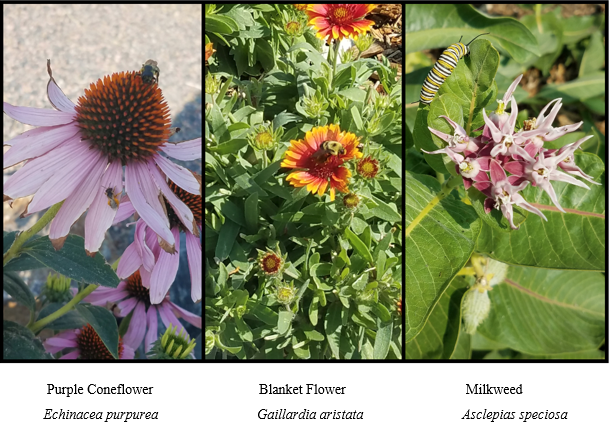Hidden Mesa Open Space (3217 CO-83, Franktown, CO 80116) is a 1,200 acre property with a trailhead that contains a picnic shelter, native pollinator garden and a research and demonstration orchard. It is bisected by Cherry Creek and the paved Cherry Creek trail. The adventurous trail system connects the meadow and the mesa and attracts cyclists, hikers, dog walkers, horseback riders, picnic groups, and photographers.

This area was originally homesteaded by William and Eliza Brian in 1878, seven years after the formation of Douglas County. William Converse acquired the property in 1884, beginning his family’s 67 year association with the property. The Converse Ranch is significant because it is associated with early agriculture and ranching in Douglas County. After a few subsequent ownership changes, Douglas County OpenSpace purchased the land along Cherry Creek in 2002. The following year, the mesa was added protecting conservation values that include historic, scenic, wildlife, agricultural and natural attributes, and to provide recreational and educational opportunities. In 2006, Douglas County Division of Open Space and Natural Resources opened the property to the public.
The cabin on this site was assembled from remnants of two log barns that were constructed on the property in the late 1870s or early 1880s. There were not enough sturdy timbers to rebuild the barns, but a sufficient amount remained for craftsman to build this replica period cabin.

The Hidden Mesa Native Plant Pollinator Garden that surrounds the cabin is maintained by Douglas County Master Gardeners and Douglas County Volunteers. The purpose of the garden is to educate local residents about the importance and beauty of using Colorado native plants in their home landscapes and to highlight plants that can be purchased from local nurseries. Why would you want to use native plants in your landscape? Native plants are well adapted to our diverse climate, soils, elevations and temperatures. They have also naturally co-evolved alongside native insects so that the insects are particularly attracted to the plants for food, pollination, and reproduction. Other pollinators include beetles, flies, moths, butterflies, and hummingbirds.
Volunteers are typically at this garden on Tuesday mornings, Spring through early Fall, but free to tour these gardens on your own or contact the Douglas County Master Gardeners for guided group tours.
The garden, which is located in USDA Plant Hardiness Zone 5 and at an elevation of 6,050 ft, was initiated in 2018 with the first native perennials planted in 2019. You will find native perennials, grasses, and shrubs as your walk through the area. Plants of various colors, heights, and textures are showcased as examples of plants that would look nice in the home landscape and attract native pollinators. All of the plants are drought tolerant, but will require supplemental water for the first few growing years. Plants on the eastern and western portion of the cabin have been chosen for those sites based upon how well they can withstand the hot western sun that we have in Colorado.
Botanical surveys of the Hidden Mesa Open Space undertaken since 2019 have documented 433 native plants, including shrubs, grasses, and perennials; this garden showcases approximately 50 of these plants. The garden has been certified as a Monarch Waystation which is a place that provides resources necessary for monarchs to produce successive generations and sustain their migration.
Most of the plants are labeled with their scientific name and common name. Be careful when searching for plants by their common name since common names are often local in use and many times do not clearly identify the specific plant. For example, throughout North America, there are more than 40 varieties of the perennial flower Liatris, also known by the common name Blazing Star and Gayfeather. Liatris punctata, native to our part of Colorado, is called Dotted Blazing Star, while Liatris ligulistylis, native to higher altitudes, is called Rocky Mountain Blazing Star or Rocky Mountain Gayfeather.
More than 70% of the world’s flowering plants rely on pollination which is essential for producing fruits, vegetables, and seeds. Pollinators and other insects also provide a critical food source for our birds. It’s up to us to do our part to keep our local pollinators thriving. Creating habitat is something that everyone can do to help support pollinators in their area.
As with the Hidden Mesa Native Plant Pollinator Garden, the Hidden Mesa Orchard and Vegetable Garden is a partnership with the Master Gardener Program and Douglas County Open Space & Natural Resources on one of their Research & Demonstration Orchards. The site is located directly south the Hidden Mesa Native Pollinator Gardens. The concept behind the orchard is to test and demonstrate to the community that a broad variety of fruit and nut crops can be successfully planted, grown, and harvested in Douglas County. It demonstrates how cultivation practices can be adopted by local residents to help grow more of their families’ produce in their own edible landscapes, regardless of the scale. Colorado Master Gardeners grow different varieties of vegetables and donate them to a local food bank.
Pollinator Resources Attracting Butterflies to the Garden (Fact Sheet No. 5.504) Attracting Butterflies with Colorado Native Plants (Front Range Wild Ones) Attracting Native Bees to Your Landscape (Fact Sheet No. 5.615) Bird-Friendly Gardening Resources (Audubon of the Rockies) Colorado Front Range Butterflies (Boulder County Nature Association) Creating Pollinator Habitat (Fact Sheet No. 5.616) Habitats for Hummingbirds in CO, WY, and SD (USDA) June is Colorado Pollinator Month (CO-HORTS blog) The Marvelous Monarch Butterfly (CO-HORTS blog) Monarch Watch Waystation Program Native Plants for Birds (Denver Audubon) Native Bee Watch Community Science Program (CSU) Plant Resources Buffalo Grass Lawns (CSU Fact Sheet 7.224) Colorado Native Plant Master Program (CSU Extension) Gardening with Native Plants (Deryn Davidson, CSU Extension, 2022) Germination Guides for Native Seeds (Wild Ones) Low Water Native Plants for Colorado Gardens: Prairie and Plains (Colorado Native Plant Society) Low Water Native Plants for Colorado Gardens: Mountains areas 7500’ Altitude (Colorado Native Plant Society) Low Water Native Plants for Colorado Gardens: Western Slope (Colorado Native Plant Society) Low Water Native Plants for Colorado Gardens : Southeastern Colorado (Colorado Native Plant Society) Low Water Native Plants for Pollinators (Multiple Contributors) Native Herbaceous Perennials for Colorado Landscapes (Fact Sheet No. 7.242) Native Seed Germination Tips (Wild Ones) Native Plant Finder (National Wildlife Federation) Native Plant Recommendations (People & Pollinators Network) Native Shrubs for Colorado Landscapes (Fact Sheet No. 7.422) Native Trees for Colorado Landscapes (Fact Sheet No. 7.421) Native Grasses for use in Colorado Landscapes (CMG GardenNotes #51) Plant Select Native Plant Origins Plant Select Straight Species Native Plants Pollinator Partnership Ecoregional Planting Guides Vascular Plants of Hidden Mesa Open Space (Douglas County Open Space & Natural Resources, 2021) Wildflowers in Colorado (Fact Sheet No. 7.233) Garden Design Examples Colorado Watersmart Native Border (Plant Select / The Horticulture Consultant) Denver / Front Range (Kenton Seth, Wild Ones) Garden in a Box from Resource Central markets water friendly garden designs, including plants, and has a native garden as an option. Resource Central also provides online classes. Plant & Seed Sales and Other Gardens We want to express our sincere gratitude to Arbor Valley Nursery and Tagawa Gardens for their generous donations of plants. The garden would not be what it is today without their support! Some local garden centers stock native plants but generally you need to ask where they are located since some garden centers have them grouped together while others disperse them among all their plants. The most important thing is to ask the store personnel, or go to their website, and request them offer more natives! Public requests make a HUGE difference! The Colorado Native Plant Society has a native plant sale in the spring. Denver Botanic Gardens has a plant sale in the spring that includes natives. The Chatfield Farms property of the Denver Botanic Gardens contains the Carol Gossard Colorado Native Plant Garden which is composed entirely of plants native to Colorado. Front Range Wild Ones has a plant swap in early summer and a seed swap in the fall. Wild Ones promotes environmentally sound landscaping practices to preserve biodiversity through the preservation, restoration and establishment of native plant communities. Wild Ones is a not-for-profit environmental education and advocacy organization founded in 1979. They also provide a list of public gardens. High Plains Environmental Center in Loveland is a wonderful area to walk through to see many different environments for native plants. You order plants online and then pick up the plants, no delivery. Note, the plants are in very small containers, so they need special attention for a while. Retail Seed and Plant Vendors providing native plants for the Front Range: Alplains– Kiowa, CO High Country Gardens – Santa Fe, NM Prairie Legacy, Inc,- Western NE Prairie Moon Nursery, Winona, MN Prairie Nursery – Westfield, WI Seeds Trust – Grand Junction, CO Sharp Bros. Seed Co. – Healy, KS Western Native Seed Company-Coaldale, CO (Vendors are listed as a service to Extension clientele. CSU Extension does not guarantee nor warrant the standard of any vendor’s product, nor does it imply approval of the product to the exclusion of others which also may be available, nor does it intend discrimination or criticism of products or providers that are mentioned or not mentioned. In addition, CSU Extension assumes no liability for harvesting or use of vendors’ product.) Useful Definitions Native (indigenous) plants refer to plants adapted to a given area during a defined time period. In America, the term often refers to plants growing in a region prior to the time of settlement by people of European descent. With recent interest in water conservation, many gardeners mistakenly consider “native” plants as “xeric” plants, and “xeric” plants as “native” plants. The two terms are not interchangeable. The concept of native should not refer to political boundaries, such as state or country, but rather to an ecological habitat during a defined chronological period. Adapted (or introduced) plants are those that reliably grow well in a given habitat without specific attention from humans in the form of winter protection, soil amendments, pest protection, water, etc. Adapted plants are considered to be low maintenance plants. Plant Select is a western plant introduction program that’s dedicated to creating smart plant choices inspired by the Rocky Mountain and has selected 170+ plant introductions and 80+ natives. Ethnobotany History Colorado – An Ethnobotany Garden Grows in Montrose Medicine Wheel Garden of the High Plains Environmental Center (YouTube) Tribal Medicine Garden at Hidden Mesa (Denver Audubon Naturalist Program) Native, adaptive, drought-tolerant, xeriscape, water-wise: Making sense of ambiguous plant terms We get a fair number of questions about “native plants”. What are these? Like colors or garden styles, plant terminology tends to flow with the times. While some terms originated with particular scientific meanings, others are marketing terms, and many of the same terms are used across a range of fields with slightly (or very) different meanings. Confusion is a likely outcome. If you find yourself flummoxed by plant terms, here’s a helpful primer. Denver Post, August 2021- Nurturing Nature at Your DoorstepPollinators – Insects and Birds
Links to external sites are provided as resources and do not imply endorsement.
Plants – Perennials, Grasses, Shrubs, and Trees
Links to external sites are provided as resources and do not imply endorsement.
Hidden Mesa Native Pollinator Garden in the News
Year
Category
Place
Plant
2024
Native Plant Arrangement
1st
Goldenrod, Whorled Milkweed, Blue Grama
2024
Phlox
1st
Scarlet Gilia Ipomopsis aggregata
2024
Perennials (other)
4th
Whorled Milkweed Asclepias verticillata
2023
Yarrow
Best in Show
White Yarrow Achillea millefolium
2023
Perennials (other)
1st
Butterfly Weed Asclepias tuberosa
2023
Penstemon
1st
Beardlip Penstemon Penstemon barbatus
2023
Penstemon
3rd
Desert Penstemon P. pseudospectabilis
2023
Ornamental Grasses
4th
Blue grama Bouteloua gracilis
2022
Coneflowers
Best in Show
Purple Coneflower Echinacea purpurea
2022
Native Plant Arrangement
1st
Goldenrod, Scarlet Gilia, Blanketflower, Prairie Sage
2022
Gaillardia
1st
Blanketflower Gaillardia aristata




